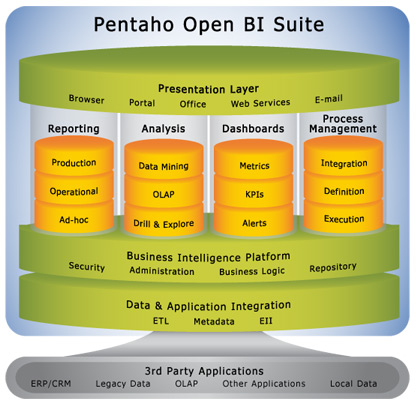
Pentaho Stirs Open Source Kettle
This week open source business intelligence vendor, Pentaho, pushed the code that powers the latest release of their Kettle offering into an Apache 2.0 license.
 The news may sound a bit strange to some since Kettle has always been open source, but there are a few key additions to the opened code that make this a newsworthy item. Most notably, their new Apache-licensed 4.3 release brings on board some of the attractive elements that used to only be available with the bulky enterprise edition.
The news may sound a bit strange to some since Kettle has always been open source, but there are a few key additions to the opened code that make this a newsworthy item. Most notably, their new Apache-licensed 4.3 release brings on board some of the attractive elements that used to only be available with the bulky enterprise edition.
This includes the all-important ability for users to tap into Hadoop resources (include its file system and MapReduce) as well as to take advantage of connectors to MongoDB and Cassandra.
This is not necessarily a surprising move for the company, which is rooted in the open source movement. Rival open source vendor, Talend, for example, has made a similar move to integrate the power (and buzzword magic) of Hadoop and this appears to be a necessary integration for upcoming suitors for their BI customers.
Pentaho claims a developer community that is somewhere between 8000, 10,000 members strong, a fact that aids its ability to stay afloat offering just support and management services for its growing list of enterprise BI users. However, as Forrester analyst James Kobielus stated this week, the move to the Apache 2.0 license from LPGL makes sense since major big data projects like Hadoop already use it. He noted that for developers, this is also good news on a licensing level since they will better able to run big data projects that incorporate multiple technologies.
According to Pentaho, the move to open source the latest Kettle release was in part “because Apache is the license under which Hadoop and several of the leading NoSQL databases are published…[which will] further accelerate the rapid adoption of Pentaho Kettle for Big Data by developers, analysts and data scientists as the go-to tool for operationalizing big data.”

Pentaho’s approach is to bring disruptive in an ecosystem that they describe as being “dominated by bureaucratic megavendors offering eye-wateringly expensive heavy-weight products built on outdated technology platforms.” Their stick-it-to-the-man messaging is propelled by the same team who started the company back in 2004.
This disruptive approach extends to their product offerings, which in addition to being open source tools (with support being the business model, of course) are designed to let users break free from the burden of calling on IT anytime they require access, integration, analysis or sleek reporting. Additionally, the platform allows users to deploy across a range of scenarios, including on-site or using a cloud-based model.
Related Stories
Talend Clarifies Oil and Gas Data Management
Jaspersoft Brings Hadoop to BI with IBM


























